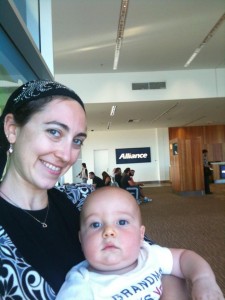Parshas Mikeitz: Traveling out of Necessity
So we are hitting the road again, which is kind of a funny statement given that we’ve been traveling pretty steadily since Tishrei. Of course, it really depends on what you define as “traveling.” I mean, is it travel if you move every day? Once a week? Once a month? What qualifies? Anyway, I would say we have been on the move since about 3 months ago.
Next week, we are planning to go on Adventuring Akiva’s first big international trip. He’s already been on 6 flights in 6 months (he’s only 6 months old!) so he’s a pro. He’s traveled more than Rabbi Ben traveled when he was an infant, so maybe one day he will surpass his father.
We are on the move because, for various reasons, we have to be. We’re not necessarily traveling because we want to (although of course we do want to; you know us!). Sometimes, circumstances require you to move whether you want to or not. You’re forced from your place.
We see a lot of forced moves in the Torah. In fact, it seems that we Jews are constantly being forced to move from our homes, like it or not. It’s partly why we have such a strong tradition of maintaining our own clothing, language, customs, and identity (and even living in our own neighborhoods, or “ghettos”) no matter where in the world we are living. There’s no point in assimilating to the local culture if you’re just going to have to move on, like it or not!
Recently, I heard a shiur about Parshas Vayetzei that mentioned how Yaakov (Jacob) had to flee his home. He goes to sleep in a certain place where he has the well-known dream of angels going up and down a ladder. He had to be in that place at that time in order to have such a dream. Even if he did not want to be fleeing his home or heading for the home of wicked Laban, he needed to be, for many reasons. And it all worked out for the best – he got not one, but four, wives, 12 sons, and untold wealth.
So, too, with Yaakov’s grandfather Avraham (Abraham). As I mentioned in my recent post on Parshas Vayera, Avraham had to leave the land of Israel and travel down to Egypt. He didn’t exactly want to have to do this. He was happy in the land Hashem (G-d) had promised him, but he was forced to leave and go down to Egypt. There are many reasons he did this, but one was that it was necessary for him and Sarah to receive the blessing of having a child. He had to go – and because he did, he was rewarded with a child.
And so it is fitting that Yaakov’s children should face the same kind of experience. In last week’s parsha, Yosef found himself heading for Egypt in conditions that were less than ideal, but in this week’s parsha we see the resolution: Yosef finds himself viceroy of Egypt, second in command only to Pharaoh himself. It all works out for the best.
And Yosef’s brothers find themselves forced to move, too, against their will. They have to travel to Egypt because a famine forces them there, as it is the only place with grain stored up. Even when they try to leave their brother Binyamin (Benjamin) behind, Yosef holds Shimon (Simon) hostage and sends them back to retrieve him. And when Yaakov tries to hold out and not let Binyamin go down to Egypt, he eventually relents because the famine forces him to. And it’s a good thing, too – as a result, the brothers are all reunited. Eventually even Yaakov travels down to Egypt and is reunited with his beloved son Yosef.
I guess that if Hashem wants you to change your place, there’s no fighting it. If He wants to force you to move, He will, whether he does it with a whisper of encouragement or by giving you a big metaphorical whack on the tuchus, so you might as well move while He’s still whispering. And that’s why there’s really no reason to be upset about having to move, even if you don’t really want to go. You need to go. It will ultimately be for the best. You just don’t know why yet – but Hashem does.
So as we head out on our international jaunt next week, we’ll be updating TravelingRabbi.com and sharing our adventures with you. I’m sure they will all reveal that this move, too, is for the very best.
Chodesh tov and Shabbat shalom!
Read more on Parshas Mikeitz: How to Forgive… But Not Forget






